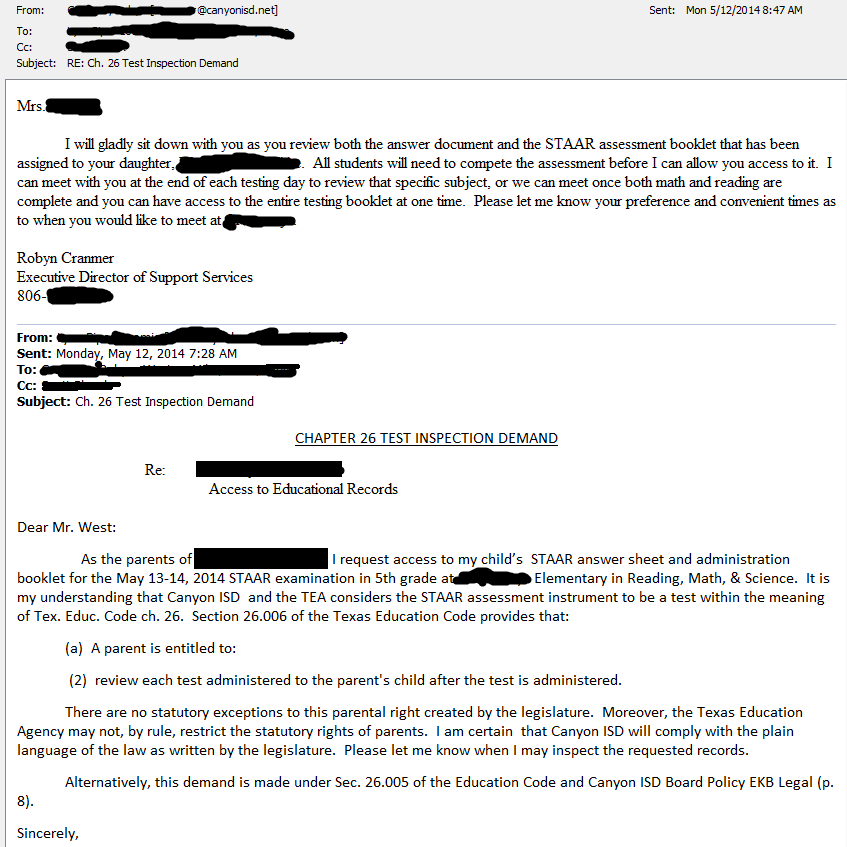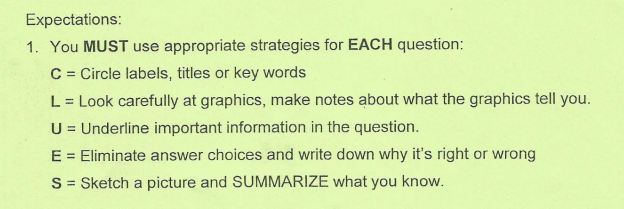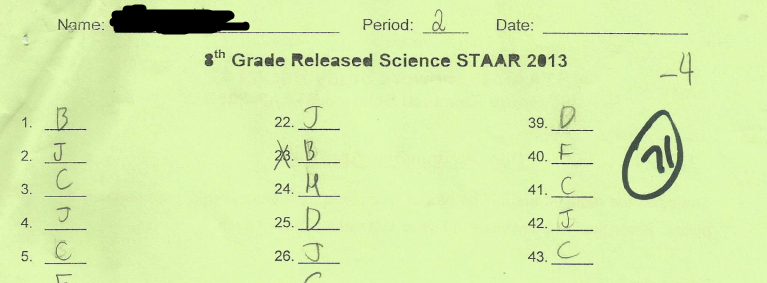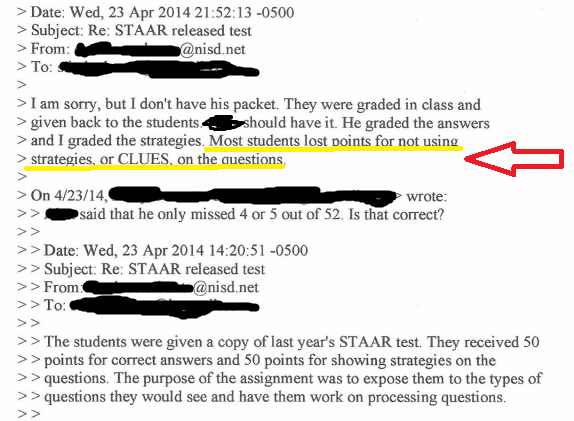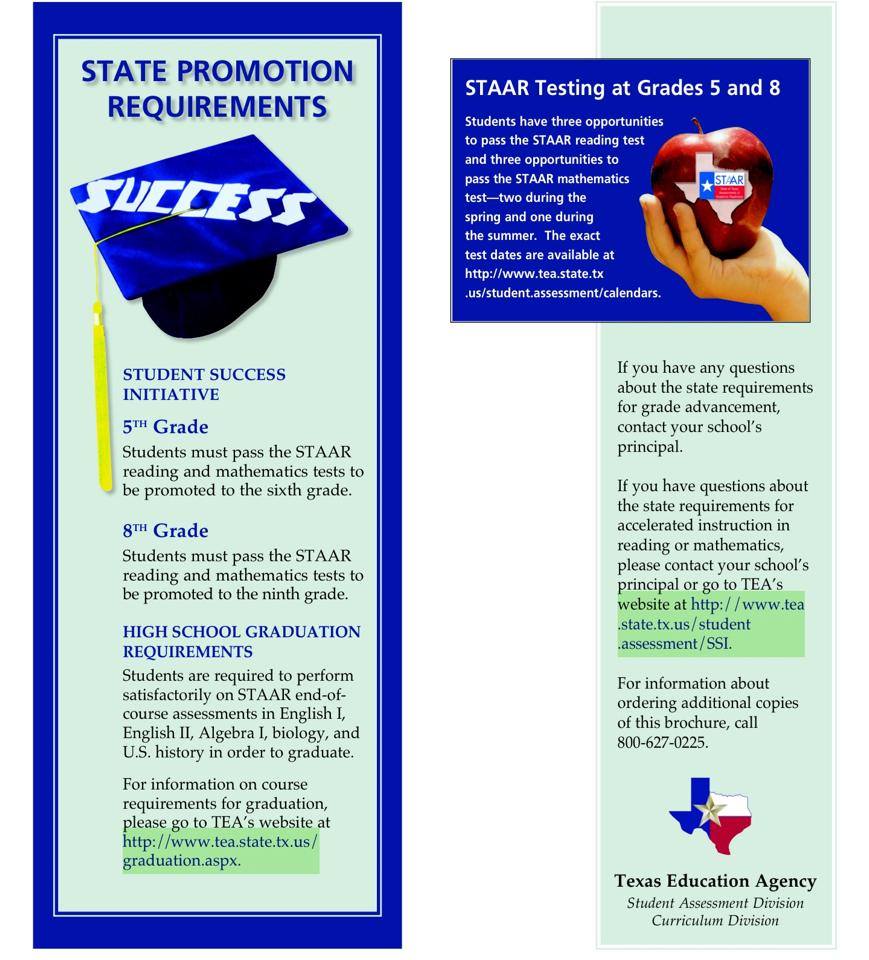If there was any doubt that the Opt-Out movement is gaining steam and raising real concerns among school districts, administrators and the TEA, that doubt was put to rest when one of the state’s premier education law firms, Walsh, Anderson, which represents dozens, if not hundreds, of school districts around the state, created a special Audio Seminar for its client school districts entitled ““OPTING-OUT” OR “OPTING-IN” – AN OVERVIEW OF PARENTS’ RIGHTS”. Along with this audio conference, a handout was provided which will undoubtedly mirror the response letters parents receive this year from Walsh, Anderson represented districts. The handout, which is linked at the end of the article, ranges from condescending to didactic to, at times, realistic about the growing demand from parents that school districts recognize their parental right to remove their children from state assessments administered as part of the STAAR/EOC assessment program. In this article, I will focus on a limited number of the Walsh, Anderson arguments. I want to preface this by saying that, notwithstanding the “hard line” espoused by the Walsh, Anderson lawyers who wrote this piece, we have resolved numerous disputes with Walsh, Anderson-represented districts to the satisfaction of our parent clients. My chief misgiving about this document is that the lawyers writing it had several opportunities to offer sound legal advice to administrators about how they can bridge the gap between the demands of parents and the demands of the TEA and still remain within the letter of the law. They chose not to offer that advice. This is disappointing, because it sets up unnecessary conflict that neither parents nor school administrators want. Indeed, the paper opens by admitting that “many school districts and school personnel agree that Texas pedagogy has become too focused on standardized testing,” but then fails to help those districts or school personnel who may wish to find creative solutions to parent demands that will satisfy both the TEA, the district, parents, and, most importantly, student needs. It is a missed opportunity, and one that will needlessly increase conflict between districts and parents.
The 26.010 Debate
Predictably, the seminar started with a review of the Education Code’s opt out provision contained in section 26.010 and the infamous “avoid a test” language. Although the author accuses Opt Out groups of deceiving parents by not telling them about the portion of the statute that refers to avoiding a test, nearly every opt out group educates parents about this issue because it is the anticipated response parents receive from the school. What the seminar fails to address is whether the “avoid a test” language refers to intent or effect. The provision that states “[a] parent is not entitled to remove the parent’s child from a class or other school activity to avoid a test.” No cases have determined whether this language refers to the motivation of the parent or to the effect of the opt out decision. If the former, then the myriad reasons that parents have to oppose the Texas assessment regime clearly evince a motivation that is far beyond avoiding a test. If the latter, then the school’s interpretation is correct (assuming a STAAR assessment is the same thing as a “test”). However, this question has never been answered and should not be so neatly dismissed by school districts.
However, the most disingenuous part of this paper is the contention that subsection (b) of the statute also serves to prohibit opt out rights. Subsection (b) reads, in the relevant part, “[t]his section does not exempt a child from satisfying grade level or graduation requirements in a manner acceptable to the school district and the agency.” This is no limitation on opt out rights, period. To claim otherwise shows either an inabilty to read a statute or simple pandering to the TEA and school districts. This section makes clear that simply because one opts out, they are not exempt from grade level or graduation requirements. (Incidentally, the inclusion of this section could be read as implicitly recognizing that parents can opt out of state assessments.) In other words, if you opt out, you aren’t therefore exempt from promotion or graduation requirements. Note, however, that it recognizes the existence of other acceptable means of meeting the requirements. In Grade 5 or 8, that means a GPC meeting. In high school, it may mean completion of a substitute assessment, or simply accepting a certificate of completion rather than a diploma. What it does not mean, however, is that this section is any type of limitation on the existence of opt out rights.
Finally, the author of this presentation dismissively treats the distinction, created by the Legislature, between an assessment and a test, using arguments intended to persuade non-lawyers, but which are ultimately weak legal arguments. First, she suggests that to understand that the words “test” and “assessment” mean the same thing in the statute, we should look at the TEA rules. However, most law students could tell you that regulations cannot alter statute. Simply because the TEA wants it to mean the same thing, doesn’t make it so. Quite to the contrary. The author reliance on an Attorney General’s opinion that refers to assessments as tests in a clause in one sentence likewise proves the point. Again, the starting point for interpreting the law is not the regulations and not an AG opinion, it is the plain language of the law and the rules of statutory construction to resolve any ambiguity. Among the rules relevant here are “'[w]ords and phrases that have acquired a technical or particular meaning, whether by legislative definition or otherwise, shall be construed accordingly.’. . . .We further presume that the Legislature selected statutory words, phrases, and expressions deliberately and purposefully.” Great-W. Life & Annuity Ins. Co. v. Texas Atty. Gen. Child Support Div., 331 S.W.3d 884, 893 (Tex. App.—Austin 2011, pet. denied). Here we know the Legislature has carefully distinguished between tests and assessments. Although the author argues that the words “test” and “assessment” are used interchangeably throughout the statute, this is simply not true. Take, for example, Chapter 39 of the Education Code, which is the very section that sets forth the assessment scheme for the State of Texas. In that entire section, there is only one instance of “test” arguably being used to refer to the state assessments (and that is in reference to receipt of the materials from the contractor and is limited to 5th and 8th grade assessments). Every other usage of the word “test” in Chapter 39 refers to either field testing of questions, or to SATs or AP tests. In contrast, that section uses the word “assessment” over 450 times. That is not exactly interchangeable. Moreover, in Chapter 26, the section on parent rights, “assessment” and “test” are never used interchangeably.
However, these are the best arguments that the schools could come up with, and we will see them again in 2014-2015.
What Constitutional Rights?
The memo further dismisses parental assertions that their 14th Amendment rights permit them to opt out. The author of the memo writes that “such arguments [are] not based on any legal premise, rather, the argument essentially consists of ‘I’m right and you’re wrong.’” Not to be too flippant, but the legal premise is quite clear and really not open to controversion. It goes like this: “The US Constitution trumps state law where the two conflict.” It’s called the Supremacy Clause and is well established. This dismissive approach to parental concerns is not helpful, nor is it good counseling to school district clients. Now, there is a real question as to whether the 14th Amendment permits a parent to opt out without consequence from state assessments. I would suggest that the weight of current authority suggests that states have the ability to enact assessment schemes and attach consequences to the failure to perform satisfactorily on the assessments. The 14th Amendment likely does not permit a parent to claim exemption from the assessment scheme. However, that is a very different question than whether a school can (or should) contravene the instruction of a parent to their child that they are to refuse to complete the assessment. We are very clear with any parent that we counsel that there are potential consequences to opting out. Indeed, I find one of the greatest strengths of the opt-out movement is the willingness of the parents to accept the consequences. We believe that under the 14th Amendment, parents have a relatively unfettered right to instruct their children not to participate in activities that they find morally objectionable or that they believe may pose mental or physical harm to their child. The school may attach consequences to that decision, but they may not contravene or override a parent’s direction to their child on this issue. We do believe this is a fundamental right of the parent and worthy of much greater respect from the districts and their attorneys.
Mark S for Score
The presentation next turns to another issue raised by TPERN and many parents: the insistence of the TEA that assessments assigned to students who refuse them be marked as “S” and returned for scoring as a zero. As TPERN pointed out in an earlier article, this results in blatant data manipulation, resulting in a representation that students who never took the assessment were actually assessed. Other codes currently exist which would accurately reflect the situation, and most states — including those with sizeable opt out movements — accurately reflect when students are not assessed. For reasons that appear completely grounded in intimidation and shaming, the TEA insists that any student who refuses to be assessed be labeled as having been assessed and missing every question. The TEA even instructs the school district to assist them with this data manipulation.
Walsh, Anderson’s advice to school districts is as expected: do whatever the TEA tells you to do whether it is right or wrong. They do not address data manipulation, other than to assure the school districts that the chance of being prosecuted for marking the score sheet “S” is “extremely low”, which must be reassuring to an administrator. Interestingly, they note that the TEA may change the scoring instructions this year. We strongly urge the TEA (and districts actually engaged enough to offer input to the TEA) to mark refused assessments in a manner that tells an accurate story: this student was not assessed. Shaming, blaming and intimidating parents and students is a strategy that will backfire and will only increase parental opposition to high stakes testing. We can make a difference here. It is a shame that given an opportunity to educate and engage their clients, this law firm has chosen instead to just urge them to go along with everything that the TEA says instead of engaging the TEA on a rule-making issue to assure that assessment results reflect reality.
Opting Out of Accelerated Instruction
Whatever the STAAR assessment may be, there is no question that the Accelerated Instruction (“AI”) that schools “offer” to students who have not passed the STAAR is not a test. Thus section 26.010 clearly permits a parent to opt out of this objectionable instruction. Amazingly, however, and without any legal analysis whatsoever, the school districts’ lawyer instructs her clients that a “school district is simply not permitted by law to grant these requests.” This selective type of statutory interpretation reeks of cowering before the TEA, as the lawyer herself calls this “a legal interpretation that TEA has affirmed.” The TEA and Walsh, Anderson are simply wrong about this. There is no rational argument that section 26.010 does not mean precisely what it says. If the legislature wanted to place accelerated instruction in the same category as a test, it knows exactly the language to use to do that. It chose not to. There is only one conclusion to draw from that: accelerated instruction is unambiguously within the scope of 26.010, and not within the small class of exclusions contained in the statute.
Moreover, the districts’ lawyers have missed an extremely important opportunity to find common ground between parents and schools. Although the statute requires schools to offer accelerated instruction, there is absolutely no statutory delineation of what that instruction must include, the amount which must be offered, or the location where it takes place. This intended flexibility contained in the statute has enabled us to reach very reasonable agreements with school districts to permit the AI to be a home study program, to be proposed by the parents as to content, and to include little to no on-campus component, thus assuring that students are not removed from electives, physical education or fine arts programming for test prep. If the attorney counseling the school districts were interested in helping the districts work together with parents, this should have been pointed out immediately and offered as a way to reach an amicable resolution with parents. Most parents don’t object to their child learning more math or English. They object to the loss of curriculum-enriching courses; they object to mindless test prep worksheets; they object to the segregation and grouping of their students in activities that signify STAAR failure to their peers. Schools have tremendous flexibility to craft AI programs for individual students. Rather than (wrongly) telling schools they must deny all AI opt out requests, a far better approach would have been to tell administrators that they can work together with parents to find solutions that meet the needs of everyone involved. It is a shame that opportunity was wasted.
Conclusions
Despite the dismal view of parental rights taken by counsel for the districts, there remains some good news in this handout. First, the Opt Out movement is being recognized as a force in education that must be dealt with at the state and local levels. Unfortunately, the chosen method of dealing with the movement still seems to be confrontation, rather than reconciliation. Hopefully, some districts will realize that it is politically perilous to favor the central planners in Austin over their local parents and start to find solutions that work for parents and schools, both. Likewise, we also hope that the TEA will change its scoring policy on refused assessments and accurately report who has been assessed and who has not been. Again, the districts could have been urged to engage on this issue, rather than sit like potted plants waiting for the decision of the TEA to be passed down from on high. Finally, the attorney’s advice, wholly lacking in legal analysis, instructing districts that they must reject AI opt out requests may be the shortest section of the memo, but it is, unfortunately, the one that signals that districts are being told to, and will, follow a path of confrontation, not reconciliation, with parents objecting to the overreach of standardized testing in the schools. While this may be quite desirable for school law attorneys who will be busily responding to parent requests at growing rates, we do not believe this will be positive for districts, schools, or parents who are best served by finding ways to work together to improve the overall educational experience of the district’s students.
[The link to this presentation was removed due to a copyright claim by Walsh, Anderson. Parents wishing to view the presentation should make a Public Information Act request to their local school district to see if they received it.]
Article by: Scott Placek, Arnold & Placek, P.C.




